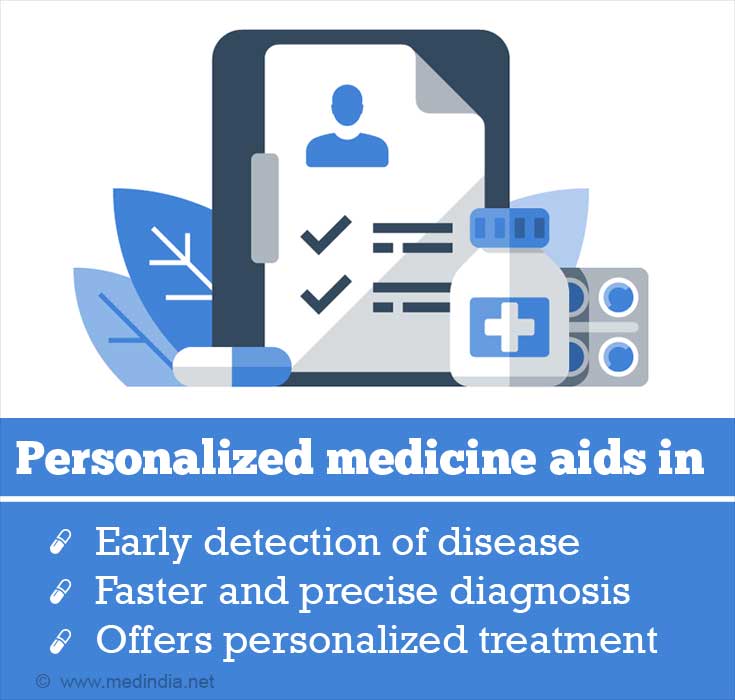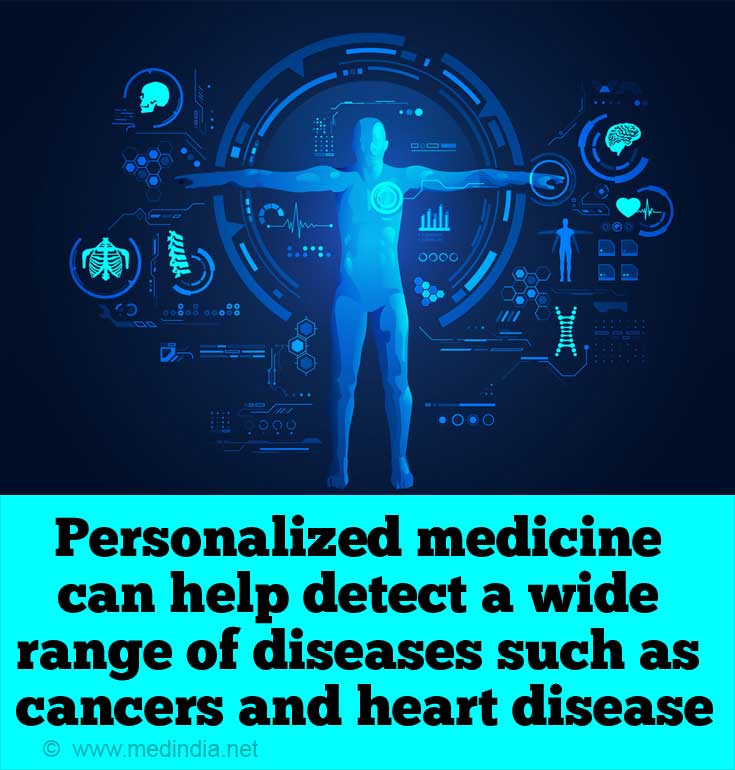- The Age of Personalized Medicine - Personalized Medicine Coalition - (http://www.personalizedmedicinecoalition.org/Userfiles/PMC-Corporate/file/pmc_age_of_pmc_factsheet.pdf)
- Value of Personalized Medicine – PhRMA - (http://phrma-docs.phrma.org/sites/default/files/pdf/chart_pack-value_of_personalized_medicine.pdf)
- Personalized Medicine: Cracking the Cancer Code – European Cancer Patient Coalition - (http://www.ecpc.org/edu/personalisedmedicine)
- What is Pharmacogenomics? Genetics Home Reference, National Institutes of Health(NIH), USA - (https://ghr.nlm.nih.gov/primer/genomicresearch/pharmacogenomics)
- Personalized Medicine – Walter & Eliza Hall Institute of Medical Research, Australia - (https://www.wehi.edu.au/research/research-fields/personalised-medicine)
- Personalized Medicine. Part 1: Evolution and Development into Theranostics - (https://www.ncbi.nlm.nih.gov/pmc/articles/PMC2957753/)
- Personalized Medicine – Mayo Clinic, USA - (http://mayoresearch.mayo.edu/center-for-individualized-medicine/personalized-medicine.asp)
- Personalized Medicine, NCI Dictionary of Cancer Terms, National Cancer Institute (NCI), National Institutes of Health (NIH), USA - (https://www.cancer.gov/publications/dictionaries/cancer-terms/def/personalized-medicine)
- Personalized Medicine: An Era of Dosage Form Development - (https://www.ncbi.nlm.nih.gov/pmc/articles/PMC5680616/)
- Personalized Medicine – All-Party Parliamentary Group - (http://www.personalisedmedicineappg.org/)
- What is Personalized Medicine? – RARE Daily by Global Genes - (https://globalgenes.org/raredaily/what-is-personalized-medicine/)
What is Personalized Medicine?
Personalized medicine is a new approach in healthcare to treat certain diseases, which produces the best outcome in predicting and managing diseases of an individual patient.
It is also known as individualized medicine or precision medicine which helps in the better management of a patient’s health problems and provides targeted therapy to the diseased part of the body.
The novel concepts of personalized medicine like genotyping or genome sequencing and data informatics have made it possible to provide a better approach to patient care based on individualized tailor-made treatment.
Personalized medicines help mainly in
- Prevention or prediction of disease by identifying the risk factors
- Early detection of disease
- Faster and accurate or precise diagnosis
- Targeted and personalized treatment of disease
- Reducing side effects of drug treatment i.e. improved drug development
- Elimination of the trial and error approach to disease treatment

What is the Relation of Genomics, Pharmacogenetics and Pharmacogenomics in Personalized Medicine?
Genomics is the study of all the genes present in the human body and their role in growth, development and health of the body. Sequencing of the entire human genome has been completed and the available sequencing data will benefit patients with rare diseases or those suffering from cancer.
Pharmacogenetics is the science that provides information on the way the genetic variations in an individual affect their response to medication.
Pharmacogenomics is the study of how genes or genetic variations influence the development of drugs. It is a combination of the science of drugs (pharmacology) and genes (genomics).
Why is Genomic Information Helpful?
Each individual is unique; the lifestyle and environment of an individual determines the health condition.
The analysis of the genome helps to classify people into subgroups and create their unique pattern or genomic profile. This, along with the clinical information, helps in predicting the risk of an individual to inherited or acquired disease; thus, preventing the onset of disease or detection at an early stage. The individual can then be treated for a condition in a unique tailored way, to make the treatment more effective and with fewer side effects.
The genomic technology also helps in understanding the causes or triggers of disease.
How does Personalized Medicine Help in Treating Cancer?
Most cancer types have a typical genomic pattern. Evaluating this genetic information would help in selecting the most suitable treatment for specific types of patients. This could help to treat a wide range of cancers, such as brain, breast, colon, and skin cancer, amongst others.

How is Personalized Medicine Impacting Patient Care for Various Diseases?
Personalized medicine is helping in patient care for a variety of diseases. Some examples include the following:
- Melanoma: Mutation of BRAF human gene is responsible for melanoma. Personalized medicine can help in detecting melanoma at an early stage
- Breast Cancer: About 30 percent of patients suffering from breast cancer have overexpressed protein HER2 (HER2-positive breast cancer), which does not respond to conventional chemotherapy. Also, the medications prescribed for breast cancer have multiple and severe side effects. Trastuzumab is a drug used for personalized targeted therapy in combination with other chemotherapeutic agents to treat this type of breast cancer
- Cardiovascular Disease: A genetic diagnostic test or gene expression profiling can help in predicting organ transplant rejection. In case of heart transplantation, personalized medicine can be used for providing tailor-made immunosuppressants in case of rejection
How do Biomarkers Contribute to Personalized Medicine?
The use of biomarkers is the main approach to personalized medicine. This is also known as pharmacodiagnostics or theranostics. These are used for predicting the onset of disease and for monitoring the progress of treatment.
Pharmacogenomic or genetic biomarkers are substances or molecules which can be detected and measured in body fluids or organs. Use of these biomarkers helps to predict adverse reactions or resistance to a drug, which in turn reduces the risk of clinical failure.









